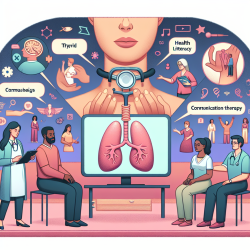Introduction
The transition towards recovery-oriented mental health systems is a critical objective for many states, including California. The Mental Health Services Act (MHSA) is a pioneering initiative aimed at reshaping mental health services to be more recovery-focused. This blog delves into insights from the research article "What Does It Take? California County Funding Requests for Recovery-Oriented Full Service Partnerships Under the Mental Health Services Act" and explores how practitioners can enhance their skills by understanding and implementing these findings.
Understanding Recovery-Oriented Systems
Recovery-oriented systems are designed to support individuals in achieving their recovery goals through accessible, flexible, and individualized services. The MHSA in California exemplifies this approach by funding Full Service Partnerships (FSPs) that emphasize comprehensive, consumer-driven care. These programs are not only about reducing symptoms but also about enhancing quality of life through services like housing, employment, and peer support.
Key Findings from the Research
The research highlights several critical insights for practitioners:
- Initial per-client budgeting for FSPs was maintained in subsequent funding cycles, indicating a stable investment in recovery-oriented services.
- Counties allocated less per client for children, suggesting a need for targeted advocacy and resource allocation to support younger populations effectively.
- The study underscores the importance of benchmarking resource allocation against recovery-oriented outcomes to ensure effective service delivery.
Implications for Practitioners
For practitioners in the field of speech-language pathology and online therapy, these findings offer several actionable insights:
- Advocacy for Children: Practitioners should advocate for equitable resource allocation for children, ensuring that young clients receive the comprehensive services necessary for their recovery.
- Outcome Evaluation: Emphasizing the evaluation of outcomes can help practitioners refine their approaches and ensure that services are genuinely recovery-oriented.
- Collaboration and Integration: Working closely with other service providers, including those in housing and employment, can enhance the holistic care provided to clients.
Encouraging Further Research
The research provides a foundation for further exploration into the resource requirements for recovery-oriented programs. Practitioners are encouraged to engage in ongoing research to identify best practices and innovative approaches that can enhance service delivery and outcomes.
Conclusion
Understanding the nuances of funding and resource allocation in recovery-oriented mental health systems is crucial for practitioners aiming to improve their skills and outcomes for clients. By leveraging insights from research and advocating for comprehensive, equitable services, practitioners can play a pivotal role in advancing recovery-oriented care.
To read the original research paper, please follow this link: What Does It Take? California County Funding Requests for Recovery-Oriented Full Service Partnerships Under the Mental Health Services Act.










